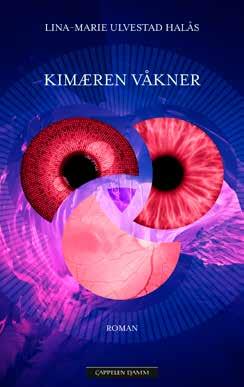
9 minute read
ENGLISH SAMPLE TRANSLATION AVAILABLE
‘Brilliant language … precise and observant. […] The novel explores, among other things, what can create a breeding ground for lonliness and xenopholia in young men, which allows them to end up as misogynists, despisers of society, or school shooters. It is well portayed, and you have to confront yourself while reading.’
DAG OG TID
‘This book is a gem, in many ways a mystery novel. Halvorsen writes with a razor sharp edge.’
DAGENS NÆRINGSLIV
Selma Lønning Aarø RIGHT TO PRIVACY
An author wakes up in hospital. Something dramatic has happened –she just can’t quite remember what. What she can recall, however, is what happened before.
When the author moves to Fredrikstad from Oslo with her family, she finds new friends, a new life and what she hopes will be the starting-point for a new novel. Her new girlfriend X has given her permission to write whatever she wants about what they describe as a major issue that has marked X’s life. It looks set to be the author’s best novel ever, but X gradually becomes increasingly unstable and intimidating, and the author realises that her entire writing project is in jeopardy. The same goes for her artistic freedom, her finances, her relationship to her publisher and colleagues – not to mention the relationships in her own family. What can an author allow herself, and who really owns a story?
Selma Lønning Aarø’s new novel is funny, sometimes frightening and unusually topical. A continuation of a strong feminist tradition, it also comments on the debate about reality literature.
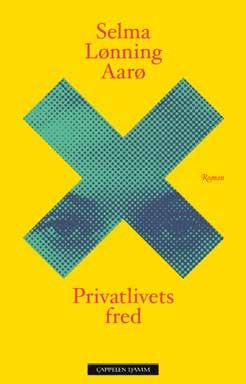
ENGLISH SAMPLE TRANSLATION AVAILABLE.
'THIS FALL'S FUNNIEST NOVEL' ADRESSEAVISA
FUNNY AND SHARP-WITTED
'What is the ethical responsibility of an author? […] Right to Privacy goes straight to the heart of this problem in a way that is both funny and thought-provoking.' AFTENPOSTEN
Norla Selected Title Autumn 2021
Selma Lønning Aarø (b. 1972) made her debut in 1995 with The Final story. She has been a newspaper columnist for Dagbladet and Klassekampen for a number of years. Her novel, I'm Coming, was translated into several languages. Her Lying Face is praised by critics and readers. Right to Privacy is her latest novel.
Rights sold to: Denmark (Straarup & co), France (Gallimard)
Excerpt from Right to Privacy
To my surprise, the pain X spoke of made the same holes in me as Mum’s pain once had. I’d tried to fill them in, these holes. I’d filled them in with travel and childbirth, with fun and frivolity, but as X spoke, each of these holes seemed to open up again, as if a plaster had been ripped off a wound. As X spoke, I was reduced to the same powerlessness I had experienced as a child. I felt the same anger I had felt as a child. X, who could fix pretty much anything, X, who went with the flow and did exactly what she felt like all the time, could not fix this. She was powerless and I didn’t want X to be powerless, just as I hadn’t wanted Mum to be either when I was younger. If I was meant to write anything at all, this was it. It was a peculiar feeling and when I left X that evening, I did the only thing I could do.
I went home across the bridge with the ever-present wind in my hair. My head grew cold and clear. I crept into my house and up the stairs and started to write.
Maratonshots
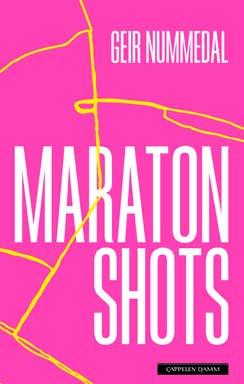
130 x 205 mm / 96 pages
Geir Nummedal MARATHON SHOTS
A man in the middle of his life is preparing for his first marathon in Dresden, but ends up going all in the night. Still, he receives a starting number and begins running. In Marathon shots we follow a 42195-metre-long race with many associative digressions along the way. With music in his ears the rhythm of the race propagates through both in his body and mind, where the stream of consciousness of the marathon runner becomes its own race within a race. Before he reached the end line, he has also run through his life.
He passes the parks of Dresden, crosses bridges, sees a bald man running with a pineapple attached to his head, he takes shots from drinking stations that often miss his mouth, instead splashing on his shirt or the ground. The experience of running mixes with the experiences of life, from erotic fantasies to childhood memories, glimpses of his father at work in the welding hall, the letters his father sent home from a worktrip to China.
The author Dag Solstad has stated that joggers are outside walking their fear of death, which is very possible. The narrator of Geir Nummedal’s Marathon shots isn’t scared of walking his fear of death, walking his rooms of remembrance, which has resulted in this particularly lively read.
Geir Nummedal (b. 1972) published his first book She's there all the time in 2012. Since then he has written a short story collection, Having Children (2012), a book single, Running text (2020) and the novel Marathon shots (2023).
Nils Horvei OSLO
The narrator of Oslo feels like he’s about to become a stranger to the city he’s lived in his whole adult life. After spending many years in Majorstua he and his wife move to Nydalen so that they can afford to buy a cabin on the coast. In his new neighbourhood he loses his footing, he doesn’t understand what kind of place he’s moved to. One day he’s run over by an electric scooter right outside a shopping centre. That’s after he’s just seen his doppelganger who he believed to be dead.
The story in this novel moves between the present and 1978 – the year his doppelganger Tom Finne disappeared without a trace. In the present the narrator fights to be able to keep living in the city which has become such an important part of his identity. He lives with the crumbs of a social life with boring pub quizzes and poker with some questionable types from the East End, while mourning no longer being part of the wine club in West Oslo. Gradually he seems to realise that the Oslo he thought he lived in, no longer exists.
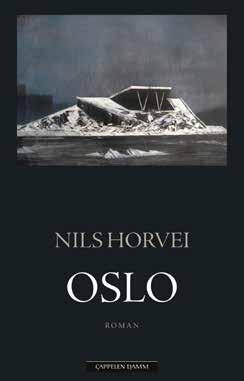
Arild Stavrum
Last Man On His Back
Albert is 20 years old and works at the dock, but when he’s not working, he is practicing wrestling. All the time. He lives in a small, worn house with his mum and two younger brothers. He’s never known his father. The year is 1936. In Europe something is brewing. The dock is bustling. Most people are working with the cuttlefish, some aren’t as lucky and have to make a living making moonshine alcohol.
Albert only has one competitor in his own town: Johnny Wiik, a rich boy who’s also his boss at the dock. When they were children, they used to play together, now they fight together. Competing for a spot in the Olympic squad. And it’s not just any old Olympic Games we’re talking about, it’s the Olympic Summer Games in Berlin, where Hitler himself will be in the stands.
Arild Stavrum writes about sport and exercise, about two men on the mat, in such a way that we can smell the action, notice the muscles tensing, the bodies being thrown around, the sweat that flows, and the test of strength that costs everything.
Last Man on His Back is a different and entertaining historical novel which amongst other things poses the eternal question: Is it right for a young man to give everything he has got to what he loves, to want to become the best in the world, without any monetary profit in sight, when he has a family at home relying on him?
Arild Stavrum (b. 1972) is a former professional football player and football coach. In 2008 he made his debut as a writer with the novel 31 years on the field. Since then he has written multiple books in many genres, and has been translated into Danish and English.
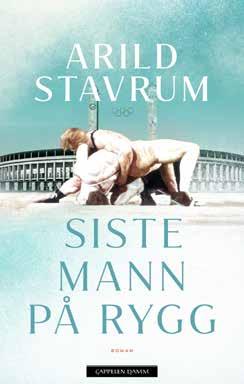
Saenger DEAR BROTHER, LITTLE SISTER
Lucie and Kristoffer have grown up together, but they are not biological siblings. They were both foster children in an extremely religious home and have always had a special relationship. On summer holiday with two friends and Kristoffer’s girlfriend Amanda a worrying situation unfolds. Flashbacks to their teenage years tell the story of how an “illegal” sexual tension builds up between Lucia and Kristoffer, and in the present Kristoffer wobbles between his foster sister and his girlfriend. He resists it but is nonetheless pulled to Lucie again and again, she seems to have a magnetic power over him.
Is the relationship between the foster siblings natural, or is it in fact problematic in the way their surroundings seem to signalise? Is it mostly harmful because those around them say it is?
This is an uncomfortable novel propelled forward by a strong drive and a sharp look at taboo relationships.
Sophia Saenger (b. 1989) grew up in Oslo and now lives in Drammen. She has a master’s degree in history of religions from the University of Oslo. She made her debut in 2022 with the novel Nothing Here Belongs to Me
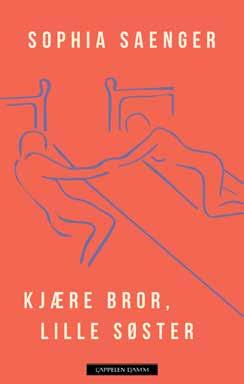
AFTENPOSTEN STAVANGEN AFTENBLAD
Kristian Klausen FROM A RUSSIAN TYPEWRITER
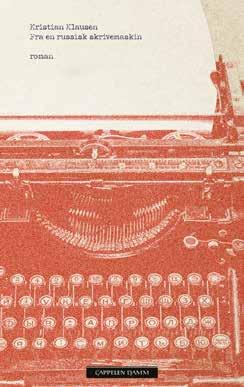
The KGB agent Mikhail Alekhin arrives in Drammen in 1971 looking for a Soviet dissident author who has gone underground. Mikhail’s mission is to carry out an assassination. In Drammen he gets to know Dordi Normann. Dordi also acts as a carer and assistant for their old father Willem – a visual artist who is defying advanced Alzheimer’s to keep painting. After meeting Dordi and Willem and seeing their dedication to art, Mikhail Alekhin becomes plagued by ideological doubts and feelings of guilt.
How will Mikhail, a Russian who’s more than used to propaganda and cultural alignment in a communist dictatorship, react to the radical political awakening which began to make waves in Norway at the time? What kind of cultural expression would he meet here? And can a human, driven by a sense of duty and loyalty, work in surveillance without causing damage to their soul?
Kristian Klausen (b. 1971) has been a freelance writer and art instructor, and currently works as an environmental therapist with a psychiatric hospice. He made his literary début in 2008 with his critically acclaimed short story collection Måltidet i Emmaus
Frederik Svindland ANIMAL HAPPINESS
After being kicked out of school, the narrator starts attending a new school in the town, where he gets new classmates and ends up part of an environment which broadens his world in all directions. Some of these friends are pretty fearless, but none as much as Sal, his old friend who also attends this school.
In the same vein of his previous books in the trilogy, Animal Happiness is a lyrical novel, propelled forward by the language, the pictorial texts are painted with at times absurd precision, full of fresh observations about friendship, insecurity and belonging. But it’s also about graffiti. And about cows.
With Animal Happiness Frederik Svindland finishes his critically acclaimed trilogy of novels offering an insight into the author’s upbringing, family, and social circle. The first novel in the series, Pelargonia, got Svinland nominated to Tarjei Vasaas’s Debut Prize, and the second novel English Fog followed in 2018.'
‘Svindland enriches the realm of books with literary sensibility, transforming the private nostalgia into a general expression of how our childhood never stops working inside us.’
KLASSEKAMPEN, ON PELARGONIA
‘Congratulation to Frederik Svindland for being the best debut writer of 2016’ MORGENBLADET, ON PELARGONIA
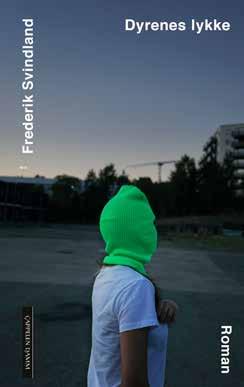
‘… the follow-up English Fog shows a language and literary talent out of the ordinary. […] With these two short and thorough novels Svindland will be acknowledged as a different voice in contemporary literature. Svindland does not yell loudly, but sees clearly, and he can describe a sunset with stunning beauty.’
DAG OG TID, ON ENGLISH FOG
Frederik Svindland (b. 1985) grew up in Porsgrunn. He has studied at the School of Creative Writing in Bø. He made his debut with the novel Pelargona in 2016, which he was nominated to the Tarjei Vesaas First Writers Award for. In 2017 he was awarded the Saabye Christensen Grant.
Someone else’s hands are washing me in the morning, doing my make-up, lifting my hair up and tying it in a bun. I am watching someone touch someone else’s body but can feel the touch on my own.
A lecture at the university discusses the possibility of freezing the brain of people who have died, with the idea to wait for the technology which allows them to bring the brain back to life in a new body. Kim volunteers, without further consideration. Suddenly she wakes up in the future. The technology they have been waiting for now exists, but the programme is shut down due to concerns that it is unethical. Kim is one of very few so-called chimeras.
Kim was a committed student with a future at a Greenpeace arrangement in Antarctica, but the life she used to live belongs to the past and she accepts a job as a maid at a hotel. After a while her memory starts to fail, and large parts of her life disappear from her. She begins to seek refuge in the world of games, and her avatar gradually becomes a larger part of the life Kim believes to be living.
The Chimera Awakens addresses popular culture and the role of modern technology and its influence on our lives.
Lina-Marie Ulvestad Halås (b. 1991) is born and raised in Eide, but lives in Oslo. She has a Bachelor in Nordic languages and literature from the University of Oslo, and has studied writing. Her debut Randhav was published in 2019.
